高一英语试讲教案
万能英语试讲教案模板高中
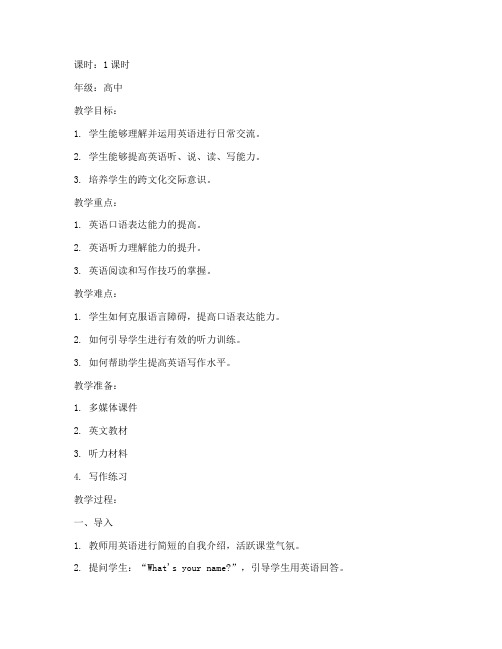
课时:1课时年级:高中教学目标:1. 学生能够理解并运用英语进行日常交流。
2. 学生能够提高英语听、说、读、写能力。
3. 培养学生的跨文化交际意识。
教学重点:1. 英语口语表达能力的提高。
2. 英语听力理解能力的提升。
3. 英语阅读和写作技巧的掌握。
教学难点:1. 学生如何克服语言障碍,提高口语表达能力。
2. 如何引导学生进行有效的听力训练。
3. 如何帮助学生提高英语写作水平。
教学准备:1. 多媒体课件2. 英文教材3. 听力材料4. 写作练习教学过程:一、导入1. 教师用英语进行简短的自我介绍,活跃课堂气氛。
2. 提问学生:“What's your name?”,引导学生用英语回答。
二、新课导入1. 教师展示多媒体课件,引入新课主题。
2. 提问:“What do you think about this topic?”,鼓励学生用英语表达自己的观点。
三、词汇教学1. 教师带领学生学习新课中的重点词汇,如:“importance, communication, culture, etc.”2. 学生通过小组讨论,运用新词汇进行句子构造。
四、听力训练1. 教师播放听力材料,学生认真听并记录关键信息。
2. 教师提问:“What did you hear?”,引导学生用英语回答。
五、口语练习1. 教师设置情景,让学生进行角色扮演,练习口语表达。
2. 学生分组进行对话练习,互相纠正发音和语法错误。
六、阅读理解1. 教师分发阅读材料,让学生自主阅读并回答相关问题。
2. 教师讲解阅读技巧,如:快速阅读、关键词查找等。
七、写作训练1. 教师布置写作任务,如:写一篇关于文化交流的短文。
2. 学生根据写作要求,进行写作练习。
八、课堂小结1. 教师总结本节课所学内容,强调重点和难点。
2. 学生回顾所学,分享自己的学习心得。
九、课后作业1. 复习本节课所学词汇和语法知识。
2. 完成课后阅读材料,并回答相关问题。
试讲高中英语微课教案模板
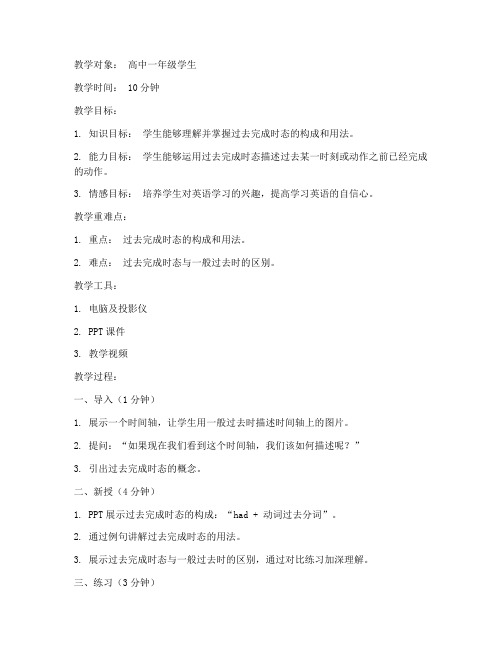
教学对象:高中一年级学生教学时间: 10分钟教学目标:1. 知识目标:学生能够理解并掌握过去完成时态的构成和用法。
2. 能力目标:学生能够运用过去完成时态描述过去某一时刻或动作之前已经完成的动作。
3. 情感目标:培养学生对英语学习的兴趣,提高学习英语的自信心。
教学重难点:1. 重点:过去完成时态的构成和用法。
2. 难点:过去完成时态与一般过去时的区别。
教学工具:1. 电脑及投影仪2. PPT课件3. 教学视频教学过程:一、导入(1分钟)1. 展示一个时间轴,让学生用一般过去时描述时间轴上的图片。
2. 提问:“如果现在我们看到这个时间轴,我们该如何描述呢?”3. 引出过去完成时态的概念。
二、新授(4分钟)1. PPT展示过去完成时态的构成:“had + 动词过去分词”。
2. 通过例句讲解过去完成时态的用法。
3. 展示过去完成时态与一般过去时的区别,通过对比练习加深理解。
三、练习(3分钟)1. 学生观看教学视频,巩固所学知识。
2. PPT展示练习题,学生独立完成。
3. 教师点评,讲解错误,纠正发音。
四、总结(1分钟)1. 回顾本节课所学内容,强调过去完成时态的构成和用法。
2. 鼓励学生在日常生活中运用所学知识。
五、作业1. 完成课后练习题。
2. 用过去完成时态描述自己过去的一天。
教学反思:本节课通过微课的形式,让学生在短时间内掌握过去完成时态的构成和用法。
在教学过程中,注重了学生的参与和互动,提高了学生的学习兴趣。
同时,通过对比练习,帮助学生区分过去完成时态与一般过去时的区别。
在今后的教学中,我将进一步探索微课在英语教学中的应用,以提高教学效果。
高中英语面试试讲教案模板

课时:1课时教学目标:1. 学生能够运用英语进行简单的自我介绍和课程导入。
2. 学生能够通过互动活动了解课堂规则和英语学习方法。
3. 学生能够通过小组讨论和角色扮演,提高英语口语表达能力。
教学重点:1. 自我介绍和课程导入。
2. 课堂规则和英语学习方法。
教学难点:1. 学生在自我介绍和课程导入时能够流畅表达。
2. 学生在小组讨论和角色扮演中能够积极参与。
教学过程:一、导入(5分钟)1. 教师用英语进行简单的自我介绍,包括姓名、教学经验、教学风格等。
2. 提问学生,让他们用英语进行自我介绍,并简要介绍自己的学习背景。
二、课堂规则和英语学习方法(10分钟)1. 教师用英语介绍课堂规则,如按时到课、认真听讲、积极参与等。
2. 分享一些英语学习方法,如词汇积累、听力训练、口语练习等。
3. 学生用英语复述课堂规则和英语学习方法。
三、小组讨论(15分钟)1. 将学生分成小组,每组选择一个主题进行讨论,如“如何提高英语成绩”、“英语学习的乐趣”等。
2. 每组派一名代表用英语总结讨论结果,并分享给全班同学。
四、角色扮演(15分钟)1. 教师给出一个情景,如购物、旅游、询问天气等,让学生进行角色扮演。
2. 学生分组,每组选择一个角色,用英语进行对话。
3. 教师巡回指导,纠正学生的发音和语法错误。
五、总结(5分钟)1. 教师用英语总结本节课的内容,强调课堂规则和英语学习方法的重要性。
2. 鼓励学生在课后继续练习英语,提高自己的口语表达能力。
教学反思:本节课通过自我介绍、课堂规则介绍、小组讨论和角色扮演等活动,帮助学生熟悉高中英语课堂环境,提高他们的英语口语表达能力。
在教学过程中,要注意以下几点:1. 鼓励学生积极参与,给予他们充分的展示机会。
2. 及时纠正学生的发音和语法错误,帮助他们提高英语水平。
3. 关注学生的个体差异,针对不同学生的需求进行教学。
4. 结合实际生活,设计贴近学生生活的教学活动,提高学生的学习兴趣。
高中英文试讲教案万能模板
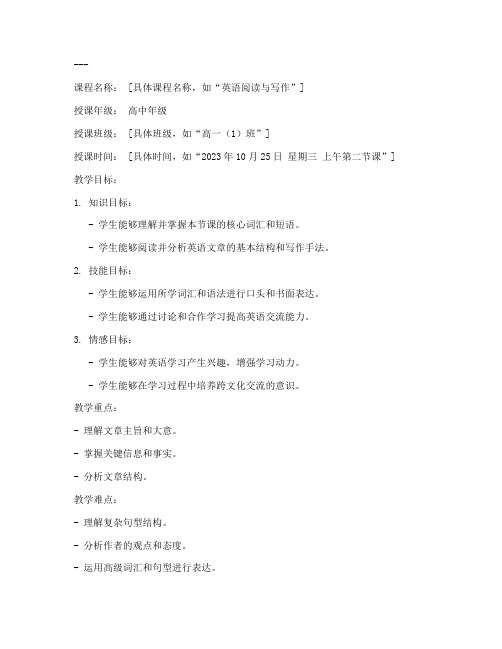
---课程名称: [具体课程名称,如“英语阅读与写作”]授课年级:高中年级授课班级: [具体班级,如“高一(1)班”]授课时间: [具体时间,如“2023年10月25日星期三上午第二节课”]教学目标:1. 知识目标:- 学生能够理解并掌握本节课的核心词汇和短语。
- 学生能够阅读并分析英语文章的基本结构和写作手法。
2. 技能目标:- 学生能够运用所学词汇和语法进行口头和书面表达。
- 学生能够通过讨论和合作学习提高英语交流能力。
3. 情感目标:- 学生能够对英语学习产生兴趣,增强学习动力。
- 学生能够在学习过程中培养跨文化交流的意识。
教学重点:- 理解文章主旨和大意。
- 掌握关键信息和事实。
- 分析文章结构。
教学难点:- 理解复杂句型结构。
- 分析作者的观点和态度。
- 运用高级词汇和句型进行表达。
教学过程:一、导入(5分钟)1. 热身活动:- 通过简短的英语歌曲或游戏,激发学生的学习兴趣。
- 引导学生回顾上节课的内容,为新的学习内容做铺垫。
2. 导入话题:- 提出与课文相关的问题或话题,引导学生思考。
二、新课讲授(25分钟)1. 阅读文章:- 学生阅读课文,教师提问,检查学生对文章的理解程度。
- 学生分享阅读感受,教师进行点评和总结。
2. 词汇学习:- 教师讲解课文中的重点词汇和短语,并进行例句展示。
- 学生跟读并练习使用新词汇。
3. 语法讲解:- 针对文章中的复杂句型,进行语法讲解和练习。
- 学生完成相关练习题,巩固所学语法知识。
4. 写作技巧:- 分析文章的写作手法,如段落结构、过渡词的使用等。
- 学生尝试运用所学技巧进行写作练习。
三、课堂活动(15分钟)1. 小组讨论:- 学生分组讨论课文中的问题,分享观点。
- 教师巡视指导,提供反馈。
2. 角色扮演:- 学生根据课文内容进行角色扮演,提高口语表达能力。
四、课堂小结(5分钟)1. 回顾总结:- 教师引导学生回顾本节课的重点内容。
- 学生总结自己的学习收获。
英语各类型试讲教案模板(共8篇)
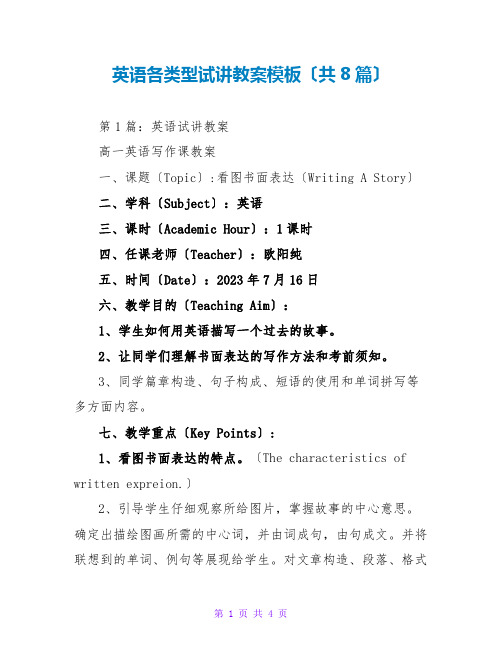
英语各类型试讲教案模板〔共8篇〕第1篇:英语试讲教案高一英语写作课教案一、课题〔Topic〕:看图书面表达〔Writing A Story〕二、学科〔Subject〕:英语三、课时〔Academic Hour〕:1课时四、任课老师〔Teacher〕:欧阳纯五、时间〔Date〕:2023年7月16日六、教学目的〔Teaching Aim〕:1、学生如何用英语描写一个过去的故事。
2、让同学们理解书面表达的写作方法和考前须知。
3、同学篇章构造、句子构成、短语的使用和单词拼写等多方面内容。
七、教学重点〔Key Points〕:1、看图书面表达的特点。
〔The characteristics of written expreion.〕2、引导学生仔细观察所给图片,掌握故事的中心意思。
确定出描绘图画所需的中心词,并由词成句,由句成文。
并将联想到的单词、例句等展现给学生。
对文章构造、段落、格式等进展修改,实现用词准确,行文流畅。
〔Observe the picture→Central idea→Important words andsentences→Structure, paragraph s, formats〕3、看图书面表达的写作方法和考前须知。
〔writing methods and precautions〕4、给出一些看图书面表达的经典开头语、衔接语和完毕语。
〔Claic opening words , interface language and conclusions.〕八、教学方法〔Teaching Methods〕:讨论法、提问法九、教学步骤〔Teaching Procedure〕:1、指出看图书面表达的特点〔Point out the characteristics of written expreion〕:①观察要有顺序,从整体到部分,或从上到下,从外到里,从左到右。
〔Sequential observation〕②方位词很重要。
高中英语教师面试试讲教案模板(共8篇)

高中英语教师面试试讲教案模板(共8篇)第1篇:高中英语面试试讲教案高中英语面试试讲教案高中英语新教材unit11教案一、教学分析 1、教材内容分析【篇1:高中英语教师资格证试讲教案】本单元围绕“scientific achievements”这一中心话题,从科学家、科学假说、科学理论、科学探索等方面设计听、说、读、写等一系列教学活动。
“warming up”部分设置了三个问题,要求学生就重要的科学成就进行讨论,从而帮助学生认识重要的科学成就,了解科学成就对社会发展、人类进步的重大贡献,同时激发学生热爱科学、投身于科学研究的热情,探索科学研究的方法。
“listening”部分设计了两道材料问题和一道开放性的情景话题。
主要培养学生捕捉和筛选信息的能力,然后要求学生在一定语言输入后进行语言输出,旨在培养学生的想象能力和使用能力,通过自己的语言体会重大科学成就的意义。
“speaking”部分重点训练表达意图和愿望的日常交际用语,以五人小组的活动形式组织学生扮演科学家的角色,陈述各人的研究方向并阐明其重要性来申请科研经费。
“reading”部分为一篇介绍中关村的形成、发展及其重要意义的记叙文。
通过对文章的理解,学习中关村人的创业精神。
“language study”部分由词汇和语法两部分组成,该部分不仅教授了四种构词法知识,更鼓励学生通过四项练习,运用构词法知识提高阅读能力。
“integrating skills”部分设计了一个阅读和写作的练习,在学生了解四大科技成就及其重要性后,要求学生略加扩充写一篇最伟大的科学成就的文章。
“tips”部分提出了说服性写作必须论点明确、论据充分,为写作提供了写作方法。
2、教学重点、难点:本单元的重点在于借助“高科技成就”这一话题,学习、复习涉及这一话题的有关语言知识和语言技能(见教学目标),激发学生热爱科学、奋发图强、献身于科学的热情。
本单元的难点在于培养学生充分利用已有的英语知识表达自己,谈论科学家、科学成就、理想抱负。
高中英语试讲万能教案模板

一、教学目标1. 知识目标:学生能够掌握本节课的词汇、句型和语法知识,并能运用所学知识进行简单的交流。
2. 能力目标:提高学生的听说读写能力,培养学生的英语思维习惯。
3. 情感目标:激发学生对英语学习的兴趣,培养学生良好的学习态度。
二、教学重点与难点1. 教学重点:词汇、句型和语法知识的掌握。
2. 教学难点:运用所学知识进行实际交流。
三、教学过程1. 导入新课(1)用简短的英语进行自我介绍,引起学生的兴趣。
(2)播放与本节课主题相关的图片或视频,激发学生的求知欲。
2. 新课呈现(1)教师用PPT展示本节课的词汇和句型,让学生跟读并模仿。
(2)教师引导学生分析词汇和句型的构成,讲解语法知识。
(3)通过小组讨论,让学生运用所学知识进行简单的对话练习。
3. 实践环节(1)组织学生进行角色扮演,巩固所学知识。
(2)开展小组竞赛,提高学生的参与度。
(3)教师巡视指导,纠正学生的发音和语法错误。
4. 课堂小结(1)教师对本节课的所学内容进行总结,强调重点和难点。
(2)布置课后作业,巩固所学知识。
5. 课后反思(1)教师对本节课的教学效果进行评价,找出不足之处。
(2)根据学生的反馈,调整教学策略,提高教学质量。
四、教学评价1. 学生对词汇、句型和语法知识的掌握程度。
2. 学生在实际交流中的运用能力。
3. 学生对英语学习的兴趣和态度。
五、教学资源1. 教学PPT2. 图片、视频等教学素材3. 课后作业六、教学反思1. 教师在教学过程中,要注意调动学生的积极性,激发学生的学习兴趣。
2. 教师要关注学生的个体差异,因材施教,提高教学质量。
3. 教师要善于运用多种教学方法,提高学生的听说读写能力。
4. 教师要不断反思教学过程,总结经验,提高自身素质。
高中英语面试试讲备课教案模板
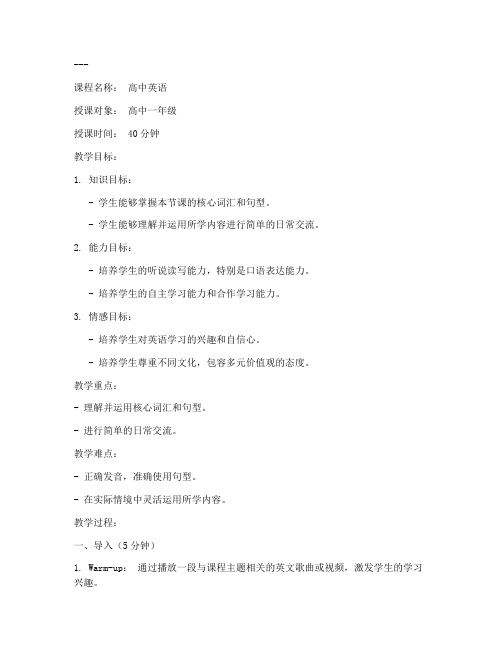
---课程名称:高中英语授课对象:高中一年级授课时间: 40分钟教学目标:1. 知识目标:- 学生能够掌握本节课的核心词汇和句型。
- 学生能够理解并运用所学内容进行简单的日常交流。
2. 能力目标:- 培养学生的听说读写能力,特别是口语表达能力。
- 培养学生的自主学习能力和合作学习能力。
3. 情感目标:- 培养学生对英语学习的兴趣和自信心。
- 培养学生尊重不同文化,包容多元价值观的态度。
教学重点:- 理解并运用核心词汇和句型。
- 进行简单的日常交流。
教学难点:- 正确发音,准确使用句型。
- 在实际情境中灵活运用所学内容。
教学过程:一、导入(5分钟)1. Warm-up:通过播放一段与课程主题相关的英文歌曲或视频,激发学生的学习兴趣。
2. Lead-in:提问与课程主题相关的问题,引导学生思考,为新课的展开做好铺垫。
二、新课讲解(25分钟)1. Vocabulary:展示本节课的核心词汇,通过图片、实物或例句等方式帮助学生理解和记忆。
2. Grammar:讲解本节课的语法点,通过例句和练习帮助学生掌握。
3. Reading:阅读一段与课程主题相关的文章,引导学生分析文章结构,理解文章大意。
4. Speaking:设置一个与课程主题相关的情境,让学生进行角色扮演或小组讨论,提高口语表达能力。
三、巩固练习(10分钟)1. Practice:设计一些与课程主题相关的练习题,让学生巩固所学知识。
2. Homework:布置一些与课程主题相关的作业,让学生课后进行复习。
四、总结与反思(5分钟)1. Summary:对本节课的内容进行总结,强调重点和难点。
2. Reflection:引导学生反思本节课的学习过程,总结学习经验。
教学评价:1. 课堂表现:观察学生在课堂上的参与度、积极性、合作精神等。
2. 作业完成情况:评估学生对作业的完成质量,了解学生的学习效果。
3. 课后反馈:收集学生对本节课的反馈意见,为今后的教学提供参考。
高中英语板书试讲教案模板

一、教学目标1. 知识与技能:掌握本节课的重点词汇、句型和语法知识,提高学生的英语听说读写能力。
2. 过程与方法:通过互动、讨论、合作等方式,培养学生的英语思维能力和表达能力。
3. 情感态度与价值观:激发学生学习英语的兴趣,培养他们的自信心和合作精神。
二、教学内容1. 单元主题:根据具体单元主题进行教学,如旅游、环保、科技等。
2. 教学内容:包括词汇、句型、语法、阅读、听力、口语等方面。
三、教学过程一、导入(5分钟)1. 通过图片、视频、歌曲等形式,激发学生对本节课主题的兴趣。
2. 提问:引导学生回顾与主题相关的词汇和知识。
二、词汇教学(10分钟)1. 介绍本节课的重点词汇,通过实物、图片、例句等方式进行讲解。
2. 学生跟读、拼写、造句,巩固所学词汇。
三、句型和语法教学(10分钟)1. 介绍本节课的重点句型和语法知识,通过例句和练习进行讲解。
2. 学生跟读、模仿、运用,掌握所学句型和语法。
四、阅读教学(15分钟)1. 介绍阅读材料,引导学生预测文章内容。
2. 学生快速阅读,找出文章主旨大意。
3. 学生精读,分析文章结构,总结段落大意。
4. 学生分享阅读感受,讨论文章内容。
五、听力教学(10分钟)1. 播放听力材料,学生认真听,注意关键词和句型。
2. 学生回答听力问题,巩固听力材料内容。
六、口语教学(10分钟)1. 学生分组进行角色扮演,运用所学词汇、句型和语法进行对话。
2. 学生展示成果,互相评价,教师点评。
七、总结与作业布置(5分钟)1. 回顾本节课所学内容,强调重点词汇、句型和语法。
2. 布置课后作业,巩固所学知识。
四、板书设计一、课题:高中英语板书试讲教案模板二、教学目标:1. 知识与技能2. 过程与方法3. 情感态度与价值观三、教学内容:1. 单元主题2. 教学内容四、教学过程:1. 导入2. 词汇教学3. 句型和语法教学4. 阅读教学5. 听力教学6. 口语教学7. 总结与作业布置五、板书要求:1. 板书内容清晰、简洁、有条理。
高中英语试讲写作教案模板(共3篇)
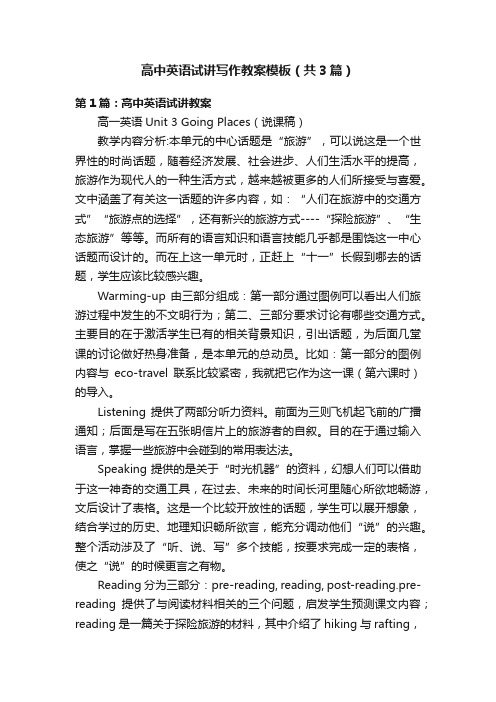
高中英语试讲写作教案模板(共3篇)第1篇:高中英语试讲教案高一英语Unit 3 Going Places(说课稿)教学内容分析:本单元的中心话题是“旅游”,可以说这是一个世界性的时尚话题,随着经济发展、社会进步、人们生活水平的提高,旅游作为现代人的一种生活方式,越来越被更多的人们所接受与喜爱。
文中涵盖了有关这一话题的许多内容,如:“人们在旅游中的交通方式”“旅游点的选择”,还有新兴的旅游方式----“探险旅游”、“生态旅游”等等。
而所有的语言知识和语言技能几乎都是围饶这一中心话题而设计的。
而在上这一单元时,正赶上“十一”长假到哪去的话题,学生应该比较感兴趣。
Warming-up 由三部分组成:第一部分通过图例可以看出人们旅游过程中发生的不文明行为;第二、三部分要求讨论有哪些交通方式。
主要目的在于激活学生已有的相关背景知识,引出话题,为后面几堂课的讨论做好热身准备,是本单元的总动员。
比如:第一部分的图例内容与eco-travel联系比较紧密,我就把它作为这一课(第六课时)的导入。
Listening提供了两部分听力资料。
前面为三则飞机起飞前的广播通知;后面是写在五张明信片上的旅游者的自叙。
目的在于通过输入语言,掌握一些旅游中会碰到的常用表达法。
Speaking 提供的是关于“时光机器”的资料,幻想人们可以借助于这一神奇的交通工具,在过去、未来的时间长河里随心所欲地畅游,文后设计了表格。
这是一个比较开放性的话题,学生可以展开想象,结合学过的历史、地理知识畅所欲言,能充分调动他们“说”的兴趣。
整个活动涉及了“听、说、写”多个技能,按要求完成一定的表格,使之“说”的时候更言之有物。
Reading 分为三部分:pre-reading, reading, post-reading.pre-reading提供了与阅读材料相关的三个问题,启发学生预测课文内容;reading 是一篇关于探险旅游的材料,其中介绍了hiking 与rafting,话题较新颖;post-reading设计了一些帮助学生检测对课文作浅层、深层理解的巩固练习。
高中英语试讲教案模板

课时:2课时年级:高中一年级教材:《人教版高中英语》教学目标:1. 知识目标:掌握本单元的核心词汇和短语,如bank note、pound、income、spend等。
2. 能力目标:提高学生的阅读理解能力和口语表达能力,能够运用所学知识进行简单的情景对话。
3. 情感目标:培养学生独立思考和团队合作的精神,激发学生对金融知识的兴趣。
教学重点:1. 理解并掌握本单元的核心词汇和短语。
2. 能够运用所学知识进行简单的情景对话。
教学难点:1. 理解文章中的复杂句型和长难句。
2. 能够根据文章内容进行合理的推测和判断。
教学过程:第一课时一、导入(5分钟)1. 利用多媒体展示一些与金钱相关的图片,如银行、货币、信用卡等,激发学生的兴趣。
2. 提问:What do you know about money? 引导学生思考金钱的作用和重要性。
二、新课导入(10分钟)1. 预习课文,让学生了解文章的大致内容。
2. 教师提问:What is the main idea of this passage? 引导学生总结文章的主题。
三、词汇教学(20分钟)1. 介绍本单元的核心词汇和短语,如bank note、pound、income、spend等。
2. 通过图片、例句等方式帮助学生理解和记忆。
3. 学生分组进行词汇接龙游戏,巩固所学词汇。
四、阅读理解(20分钟)1. 让学生阅读课文,并回答问题,如:What happened to the man? Why did he lose the money? 等。
2. 教师讲解文章中的复杂句型和长难句,帮助学生理解文章内容。
3. 学生分组讨论文章的主题和意义,培养学生的团队合作精神。
五、课堂小结(5分钟)1. 回顾本节课所学内容,强调重点词汇和短语。
2. 鼓励学生在课后继续阅读相关文章,提高自己的英语水平。
第二课时一、复习导入(5分钟)1. 复习上一节课所学词汇,如bank note、pound、income、spend等。
高中英语试讲家教教案模板

一、教学目标1. 知识目标:(1)掌握本节课的重点词汇和短语;(2)学会运用本节课的语法知识;(3)提高学生的阅读理解能力。
2. 能力目标:(1)提高学生的口语表达能力;(2)培养学生的自主学习能力;(3)锻炼学生的思维能力和应变能力。
3. 情感目标:(1)激发学生对英语学习的兴趣;(2)培养学生良好的学习习惯;(3)增强学生的自信心。
二、教学内容1. 词汇:本节课将学习以下重点词汇和短语:sustainable,environmental,alternative,contribute,preserve。
2. 语法:本节课将学习一般现在时态的被动语态。
3. 阅读理解:一篇关于环保的文章。
三、教学过程1. 导入(1)与学生进行简单的英语对话,拉近与学生之间的距离;(2)引入本节课的主题——环保。
2. 词汇教学(1)通过图片、实物等展示本节课的重点词汇;(2)通过例句让学生了解词汇的用法;(3)让学生进行词汇接龙游戏,巩固所学词汇。
3. 语法教学(1)讲解一般现在时态的被动语态;(2)通过例句让学生掌握被动语态的构成和用法;(3)让学生进行语法练习,巩固所学语法知识。
4. 阅读理解(1)让学生快速阅读文章,了解文章大意;(2)引导学生分析文章结构,提炼文章中心思想;(3)让学生回答阅读理解题,巩固所学知识。
5. 口语练习(1)让学生用本节课的词汇和语法知识进行口语对话;(2)教师进行点评和指导,纠正学生的发音和语法错误。
6. 总结(1)回顾本节课所学内容;(2)布置课后作业,巩固所学知识。
四、教学评价1. 课堂参与度:观察学生在课堂上的表现,评价学生的积极参与程度。
2. 词汇掌握情况:通过提问、游戏等方式,检验学生对词汇的掌握程度。
3. 语法运用能力:通过口语练习和写作练习,评价学生对语法的运用能力。
4. 阅读理解能力:通过阅读理解题的完成情况,评价学生的阅读理解能力。
5. 学习态度:观察学生的学习态度,评价学生的学习兴趣和学习习惯。
高中英语编制试讲教案模板
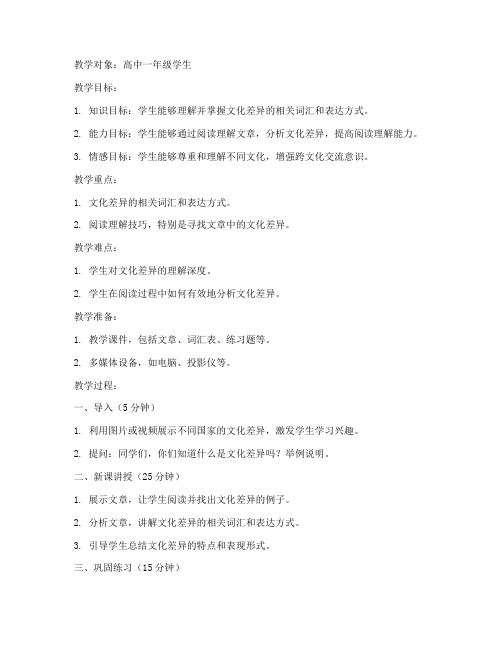
教学对象:高中一年级学生教学目标:1. 知识目标:学生能够理解并掌握文化差异的相关词汇和表达方式。
2. 能力目标:学生能够通过阅读理解文章,分析文化差异,提高阅读理解能力。
3. 情感目标:学生能够尊重和理解不同文化,增强跨文化交流意识。
教学重点:1. 文化差异的相关词汇和表达方式。
2. 阅读理解技巧,特别是寻找文章中的文化差异。
教学难点:1. 学生对文化差异的理解深度。
2. 学生在阅读过程中如何有效地分析文化差异。
教学准备:1. 教学课件,包括文章、词汇表、练习题等。
2. 多媒体设备,如电脑、投影仪等。
教学过程:一、导入(5分钟)1. 利用图片或视频展示不同国家的文化差异,激发学生学习兴趣。
2. 提问:同学们,你们知道什么是文化差异吗?举例说明。
二、新课讲授(25分钟)1. 展示文章,让学生阅读并找出文化差异的例子。
2. 分析文章,讲解文化差异的相关词汇和表达方式。
3. 引导学生总结文化差异的特点和表现形式。
三、巩固练习(15分钟)1. 分组讨论,让学生结合自己的生活经验,举例说明文化差异。
2. 完成练习题,包括选择题、填空题和简答题,巩固所学知识。
四、课堂小结(5分钟)1. 总结本节课所学内容,强调文化差异的理解和尊重。
2. 布置课后作业,让学生阅读相关文章,了解更多的文化差异。
五、课后作业1. 阅读一篇关于文化差异的英文文章,总结文章中的主要观点。
2. 结合自己的生活经验,写一篇关于文化差异的短文。
教学反思:本节课通过阅读理解文章,让学生了解文化差异的相关知识,提高了学生的阅读理解能力。
在教学过程中,应注意以下几点:1. 注重学生的参与,鼓励学生积极发言,提高课堂氛围。
2. 结合学生的生活实际,让学生更好地理解文化差异。
3. 通过课后作业,巩固所学知识,提高学生的综合运用能力。
高中英语试讲教案
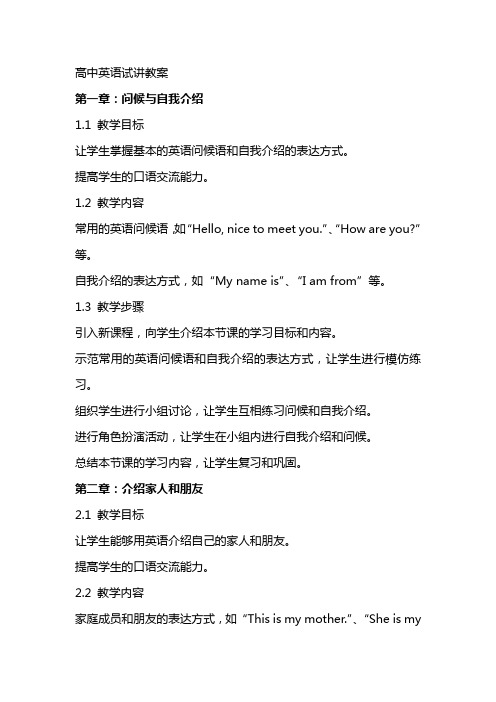
高中英语试讲教案第一章:问候与自我介绍1.1 教学目标让学生掌握基本的英语问候语和自我介绍的表达方式。
提高学生的口语交流能力。
1.2 教学内容常用的英语问候语,如“Hello, nice to meet you.”、“How are you?”等。
自我介绍的表达方式,如“My name is”、“I am from”等。
1.3 教学步骤引入新课程,向学生介绍本节课的学习目标和内容。
示范常用的英语问候语和自我介绍的表达方式,让学生进行模仿练习。
组织学生进行小组讨论,让学生互相练习问候和自我介绍。
进行角色扮演活动,让学生在小组内进行自我介绍和问候。
总结本节课的学习内容,让学生复习和巩固。
第二章:介绍家人和朋友2.1 教学目标让学生能够用英语介绍自己的家人和朋友。
提高学生的口语交流能力。
2.2 教学内容家庭成员和朋友的表达方式,如“This is my mother.”、“She is mybest friend.”等。
询问家人和朋友的方式,如“How many brothers do you have?”、“Do you have any friends?”等。
2.3 教学步骤引入新课程,向学生介绍本节课的学习目标和内容。
示范如何用英语介绍家人和朋友,让学生进行模仿练习。
组织学生进行小组讨论,让学生互相练习介绍家人和朋友。
进行角色扮演活动,让学生在小组内进行介绍家人和朋友的练习。
总结本节课的学习内容,让学生复习和巩固。
第三章:日常用品和衣物3.1 教学目标让学生能够用英语表达日常用品和衣物的名称。
提高学生的词汇量。
3.2 教学内容日常用品和衣物的英语名称,如“pen”、“pencil”、“shirt”、“pants”等。
3.3 教学步骤引入新课程,向学生介绍本节课的学习目标和内容。
展示日常用品和衣物的图片,让学生进行观察和记忆。
让学生听老师念出单词,并进行默写练习。
组织学生进行小组游戏,通过找出隐藏的单词来巩固记忆。
高中英语真人试讲教案模板

课时:2课时年级:高中一年级教材:人教版高中英语教学目标:1. 知识目标:学生能够掌握与未来职业相关的词汇和表达方式,如job, career, dream job等。
2. 能力目标:学生能够运用所学词汇和句型,进行关于未来职业的讨论和表达。
3. 情感目标:激发学生对未来职业的思考和规划,培养学生的职业意识。
教学重难点:1. 重点:掌握与未来职业相关的词汇和句型。
2. 难点:灵活运用所学词汇和句型进行实际交流。
教学准备:1. 多媒体课件2. 学生教材3. 白板和粉笔教学过程:第一课时一、导入1. 利用图片展示不同职业,引导学生思考:“What's your dream job?”2. 学生自由发言,教师总结并板书相关词汇:job, career, dream job。
二、新课学习1. 教师展示多媒体课件,引导学生学习与未来职业相关的词汇和句型。
2. 学生跟读并模仿,教师纠正发音。
三、练习1. 完成教材中的练习题,巩固所学词汇和句型。
2. 学生分组进行角色扮演,模拟求职面试场景。
四、小结1. 教师总结本节课所学内容,强调重点和难点。
2. 学生分享学习心得,教师给予评价和指导。
第二课时一、复习1. 回顾上节课所学内容,检查学生对词汇和句型的掌握情况。
2. 学生分组进行快速问答,巩固所学知识。
二、拓展1. 教师展示多媒体课件,介绍不同国家的职业特点。
2. 学生分组讨论,分享自己对未来职业的期望和规划。
三、任务1. 学生以小组为单位,设计一份关于未来职业的调查问卷。
2. 各小组进行问卷调查,收集数据并进行分析。
四、展示1. 各小组展示调查结果,分享自己的发现和观点。
2. 教师给予评价和指导,鼓励学生积极参与。
五、小结1. 教师总结本节课所学内容,强调职业意识的重要性。
2. 学生分享学习心得,教师给予评价和指导。
教学反思:本节课通过导入、新课学习、练习、拓展、任务和展示等环节,帮助学生掌握与未来职业相关的词汇和句型,培养学生的职业意识。
檀园高中英语试讲教案模板

课时:1课时年级:高中一年级教材:《英语》人教版教学目标:1. 知识目标:学生能够掌握本单元的生词和短语,如neighbourhood, community, park, supermarket等。
2. 能力目标:学生能够运用所学词汇和句型进行简单的日常对话,描述自己的居住环境。
3. 情感目标:培养学生对家乡的热爱,增强学生的社会责任感。
教学重点:1. 生词和短语的掌握。
2. 描述居住环境的句型运用。
教学难点:1. 生词和短语的灵活运用。
2. 学生能够用英语进行流畅的口语表达。
教学过程:一、导入(5分钟)1. 利用图片展示不同的居住环境,如小区、公园、超市等,激发学生的兴趣。
2. 提问:Do you know what a neighbourhood is? 引导学生思考并回答。
二、新课讲授(20分钟)1. 生词讲解:- 利用卡片展示生词,如neighbourhood, community, park, supermarket等,并引导学生朗读。
- 结合例句,讲解生词的用法。
2. 句型讲解:- 介绍描述居住环境的句型,如:- My neighbourhood is very beautiful.- There is a park near my home.- My home is near the supermarket.- 通过图片或实物展示,让学生进行情景对话练习。
3. 拓展活动:- 分组讨论:让学生描述自己的居住环境,并运用所学词汇和句型进行表达。
- 小组展示:各小组轮流展示自己的描述,其他学生进行评价。
三、巩固练习(10分钟)1. 完形填空:让学生根据所学词汇和句型,完成一篇关于居住环境的短文。
2. 词汇接龙:将学生分成两组,进行词汇接龙游戏,巩固所学词汇。
四、总结与作业(5分钟)1. 总结本节课所学内容,强调重点和难点。
2. 布置作业:- 每位学生用英语描述自己的居住环境,不少于100字。
高中英语试讲教案范文集锦

高中英语试讲教案范文集锦一、教案设计:1. 教学目标:(1)知识目标:学生能够掌握单词“democracy, government, economy, culture”等,并能够运用到实际情景中。
(2)能力目标:学生能够听懂、说出一篇关于不同国家政治制度的短文。
(3)情感目标:培养学生对不同政治制度的兴趣和好奇心。
2. 教学内容:(1)单词:democracy, government, economy, culture(2)短文:介绍不同国家的政治制度。
3. 教学重点与难点:重点:单词“democracy, government, economy, culture”的掌握与运用。
难点:听懂并能够说出关于不同国家政治制度的短文。
4. 教学方法:情境教学法、互动式教学法。
5. 教学过程:(1)热身活动:学生自由讨论自己国家的政治制度。
(2)新课导入:教师展示相关图片,引导学生学习单词“democracy, government, economy, culture”。
(3)课堂讲解:教师讲解不同国家的政治制度,引导学生进行思考和讨论。
(4)小组活动:学生分组,每组选择一个国家的政治制度进行研究,并准备进行汇报。
(5)汇报展示:各组进行汇报,其他学生进行评价和讨论。
(6)总结与作业:教师总结本节课的内容,布置作业:写一篇关于自己国家政治制度的短文。
二、教案设计:1. 教学目标:(1)知识目标:学生能够掌握单词“freedom, human rights, law, education”等,并能够运用到实际情景中。
(2)能力目标:学生能够听懂、说出关于不同国家政治制度的短文。
(3)情感目标:培养学生对不同政治制度的兴趣和好奇心。
2. 教学内容:(1)单词:freedom, human rights, law, education(2)短文:介绍不同国家的政治制度。
3. 教学重点与难点:重点:单词“freedom, human rights, law, education”的掌握与运用。
高中英语试讲新颖教案模板
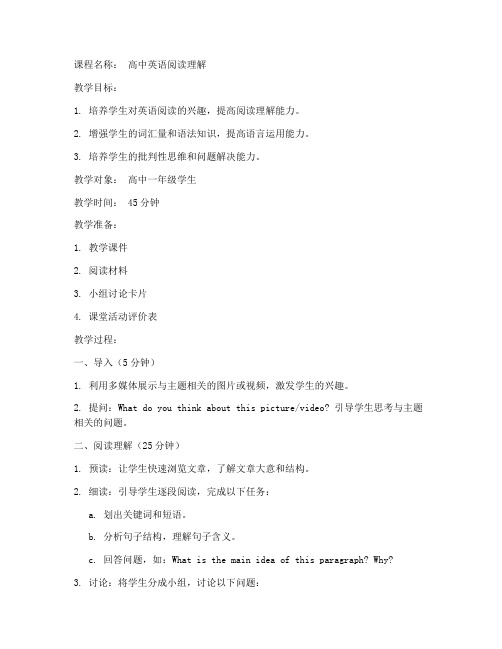
课程名称:高中英语阅读理解教学目标:1. 培养学生对英语阅读的兴趣,提高阅读理解能力。
2. 增强学生的词汇量和语法知识,提高语言运用能力。
3. 培养学生的批判性思维和问题解决能力。
教学对象:高中一年级学生教学时间: 45分钟教学准备:1. 教学课件2. 阅读材料3. 小组讨论卡片4. 课堂活动评价表教学过程:一、导入(5分钟)1. 利用多媒体展示与主题相关的图片或视频,激发学生的兴趣。
2. 提问:What do you think about this picture/video? 引导学生思考与主题相关的问题。
二、阅读理解(25分钟)1. 预读:让学生快速浏览文章,了解文章大意和结构。
2. 细读:引导学生逐段阅读,完成以下任务:a. 划出关键词和短语。
b. 分析句子结构,理解句子含义。
c. 回答问题,如:What is the main idea of this paragraph? Why?3. 讨论:将学生分成小组,讨论以下问题:a. 文章的主题是什么?b. 文章中的观点是什么?c. 文章的论据是什么?d. 文章的结论是什么?4. 展示:每组选一名代表展示讨论结果,其他组进行评价。
三、拓展活动(10分钟)1. 词汇学习:引导学生找出文章中的新单词,并运用到句子中。
2. 语法练习:针对文章中的语法点进行练习,如:时态、语态、非谓语动词等。
3. 写作:让学生根据文章内容,写一篇短文,如:总结文章内容、表达自己的观点等。
四、总结与评价(5分钟)1. 教师总结本节课的重点内容,强调阅读理解的方法和技巧。
2. 学生自评和互评,评价自己在阅读理解方面的进步和不足。
3. 教师根据评价结果,给予学生针对性的指导。
教学反思:1. 本节课是否达到了教学目标?2. 学生在阅读理解方面是否有所提高?3. 教学过程中是否遇到了问题,如何解决?4. 如何改进教学方法和策略,提高教学效果?注意事项:1. 注重学生的主体地位,激发学生的学习兴趣。
高中英语试讲新颖教案模板

课时:1课时教学目标:1. 知识目标:掌握本单元的词汇和短语,如:slogan、team、performance、enthusiast等。
2. 能力目标:提高学生的听、说、读、写能力,特别是在阅读和写作方面的能力。
3. 情感目标:培养学生对体育运动的热爱,增强团队协作精神。
教学重点:1. 词汇:slogan、team、performance、enthusiast等。
2. 句型:How do you like…?What’s your favorite…?I prefer…to…教学难点:1. 词汇的运用和搭配。
2. 句型的灵活运用。
教学过程:一、导入(5分钟)1. 利用多媒体展示本单元主题图片,引导学生谈论自己对体育运动的看法。
2. 提问:What sports do you like? Why?3. 学生自由发言,教师总结并引出本节课主题:Sports。
二、新课导入(10分钟)1. 教师带领学生朗读课文,注意语音、语调,帮助学生熟悉课文内容。
2. 分组讨论课文中的问题,如:- What is the main idea of the text?- Who are the main characters in the text?- What are their attitudes towards sports?3. 学生汇报讨论结果,教师点评并总结。
三、词汇教学(15分钟)1. 教师利用多媒体展示本单元的词汇,如:slogan、team、performance、enthusiast等。
2. 学生跟读,教师纠正发音。
3. 词汇运用练习:- 完形填空:根据课文内容,填入合适的词汇。
- 造句:用所学词汇造句,如:I prefer football to basketball.四、句型教学(10分钟)1. 教师展示句型:How do you like…?What’s your favorite…?I prefer…to…2. 学生跟读,教师纠正发音。
高一英语试讲教案(完整资料).doc
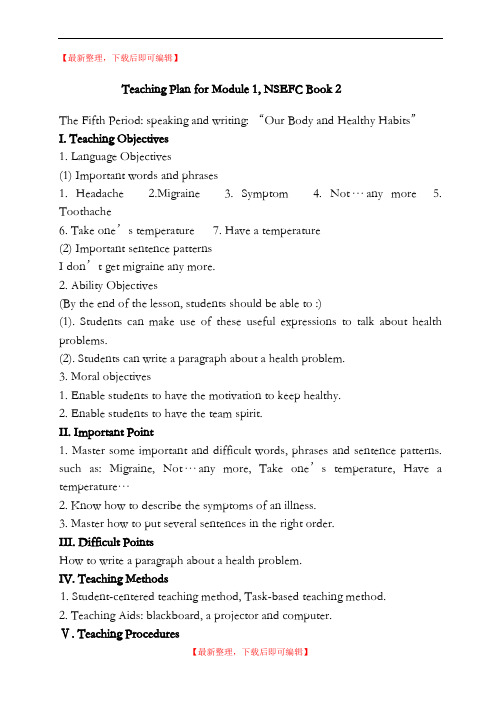
【最新整理,下载后即可编辑】Teaching Plan for Module 1, NSEFC Book 2The Fifth Period: speaking and writing: “Our Body and Healthy Habits”I. Teaching Objectives1. Language Objectives(1) Important words and phrases1. Headache2.Migraine3. Symptom4. Not…any more5. Toothache6. Take one’s temperature7. Have a temperature(2) Important sentence patternsI don’t get migraine any more.2. Ability Objectives(By the end of the lesson, students should be able to :)(1). Students can make use of these useful expressions to talk about health problems.(2). Students can write a paragraph about a health problem.3. Moral objectives1. Enable students to have the motivation to keep healthy.2. Enable students to have the team spirit.II. Important Point1. Master some important and difficult words, phrases and sentence patterns. such as: Migraine, Not…any more, Take one’s temperature, Have a temperature…2. Know how to describe the symptoms of an illness.3. Master how to put several sentences in the right order.III. Difficult PointsHow to write a paragraph about a health problem.IV. Teaching Methods1. Student-centered teaching method, Task-based teaching method.2. Teaching Aids: blackboard, a projector and computer.Ⅴ. Teaching ProceduresStepⅠLead-in(3mins)(At first, the teacher greets students, and then asks all students to review these worlds that they have learned in the four parts this module. Especially, the words which relate to illness. such as: toothache, headache, flu, migraine, get a cold, have a temperature, sore throat…)T: Good morning, girls and boys! Today, we continue to learn this module. Before starting our class, I want you to review these words which relate to illness we have learned in this module. What are them?Ss: …T: Of course, there are many other words relate to illness, you should pay attention to them maybe; we use them in the speaking and writing parts. Now please turn to page8, speaking 2.StepⅡPre-writing (whole class work)(20mins)Speaking (pair-work) (8mins)(Ask students to discuss with their partners to make a dialogue about a health problem. At first, ask two students to read and translate the example on the textbook to make sure the students understand it. Then tell students they can use the example on their textbook as a sample. Give them 4mins to prepare the dialogue. Then ask 2 groups to play for the whole class. At last, teacher makes a conclusion that students should pay more attention to how to describe the symptoms of an illness.)T: We have learned much information about our body and illness. Now please look at the speaking two, the example on our textbook. Who want to read it for us?Ss:(read the example)T: OK. Who would like to translate it for us?S: (ask one student to translate it)T: Do you understand this example? Now please discuss with your partners to make a dialogue like the example. Of course, you can make a more integrated dialogue. But your dialogue must include the name of the illness and the description of the illness’s symptoms. Do it!(4mins later)T: Stop. Now, some volunteers share your dialogue with us?SA and SB (hands up)T: OK. Please!Ss:…T: Well done! Someone else? (Ask another pairs to do it)Ss: …T: OK. In this part, we have learned to how to describe the symptoms of an illness. If you like, you can make more dialogues to practice after class. OK, the following time we will deal with the ordering activity.Ordering the sentences (8mins)(First, the teacher lets the students skim these sentences themselves, and then the teacher deals with the difficulty that students can’t understand. Teacher gives students 3mins to order them in right order. Give one minute to students to check their answer with their partners. Then ask two or three students to give their answer to whole class. Teacher gives the right answer to students, and gives the reasons.)T: there are eight sentences in this part, please skim these sentences yourselves to find out the difficulty that you can’t understand. (2mins later) Do you have any difficulty?S: I can’t understand sentence “e”.T: There is an important phrase“not …any more”in this sentence you can use another phrase “no more” to instead of it. Give you an example: if you tell lies again, I will not believe you any more. Do you understand now?Ss: …T: Who would like to share your answer with our classmates? How about your idea? (Ask a student to answer)S1: …T: Do you agree?Ss: …T: Look at them. We learn it together. From this paragraph’s main idea, we know it is about the boy’s experience form being sick to get well. Right? So we can order these sentences by the sequence of events, So the right answer is6,3,5,2,8,1,7,4. Understand?Ss: …T: Now please read the paragraph together. “I am a sixteen-year-old boy.”Begins!Ss: …Show a simple(5mins)T: Now, I show you one sample about this writing. Please look at it. Pay attention to the grammar and tense.T: Generally, we should use the past tense not the present tense. You can arrange your compositions’ structure by the order of time. …StepⅢWhile-writing (individual activity)(10mins)(Teacher explains the four requirements to students and asks students to write a paragraph about a small health problem that they have had. Tell students they can use the activity one as a model when they arrange their paragraph’s structure. In another word, they should start with the self-introduction, and then tell what’s wrong with her or him and what has she or he did to deal it with. Finally, give detail information about the ending.) T: OK. We have learned how to describe the symptoms of the illness and have showed you the sample. Now, please turn to page9 to write a paragraph about a small health problem that you have had according to the four requirements. You can use the activity 1 as a model and arrange your paragraph’s structure like it. And you have 10mins to write. Do it now! If you have some questions about the writing, you can put your hands up. OK? Four requirements:1. Begin with Some information about yourself. (Your age, your sex)2. What the problem was. (What’s wrong with you?)3. Explain what you did or what happened. (What did you do to deal with your illness?)4. Explain how things ended。
- 1、下载文档前请自行甄别文档内容的完整性,平台不提供额外的编辑、内容补充、找答案等附加服务。
- 2、"仅部分预览"的文档,不可在线预览部分如存在完整性等问题,可反馈申请退款(可完整预览的文档不适用该条件!)。
- 3、如文档侵犯您的权益,请联系客服反馈,我们会尽快为您处理(人工客服工作时间:9:00-18:30)。
Teaching Plan for Module 1, NSEFC Book 2The Fifth Period: speaking and writing: “Our Body and Healthy Habits”I. Teaching Objectives1. Language Objectives(1) Important words and phrases1. Headache2.Migraine3. Symptom4. Not…any more5. Toothache6. Take one’s temperature7. Have a temperature(2) Important sentence patternsI don’t get migraine any more.2. Ability Objectives(By the end of the lesson, students should be able to :)(1). Students can make use of these useful expressions to talk about health problems.(2). Students can write a paragraph about a health problem.3. Moral objectives1. Enable students to have the motivation to keep healthy.2. Enable students to have the team spirit.II. Important Point1. Master some important and difficult words, phrases and sentence patterns. such as: Migraine, Not…any more, Take one’s temperature, Have a temperature…2. Know how to describe the symptoms of an illness.3. Master how to put several sentences in the right order.III. Difficult PointsHow to write a paragraph about a health problem.IV. Teaching Methods1. Student-centered teaching method, Task-based teaching method.2. Teaching Aids: blackboard, a projector and computer.Ⅴ. Teaching ProceduresStepⅠLead-in(3mins)(At first, the teacher greets students, and then asks all students to review these worlds that they have learned in the four parts this module. Especially, the words which relate to illness. such as: toothache, headache, flu, migraine, get a cold, have a temperature, sore throat…)T: Good morning, girls and boys! Today, we continue to learn this module. Before starting our class, I want you to review these words which relate to illness we have learned in this module. What are them?Ss: …T: Of course, there are many other words relate to illness, you should pay attention to them maybe; we use them in the speaking and writing parts. Now please turn to page8, speaking 2. StepⅡPre-writing (whole class work)(20mins)Speaking (pair-work) (8mins)(Ask students to discuss with their partners to make a dialogue about a health problem. At first, ask two students to read and translate the example on the textbook to make sure the students understand it. Then tell students they can use the example on their textbook as a sample. Give them 4mins to prepare the dialogue. Then ask 2 groups to play for the whole class. At last, teacher makes a conclusion that students should pay more attention to how to describe the symptoms of an illness.)T: We have learned much information about our body and illness. Now please look at the speaking two, the example on our textbook. Who want to read it for us?Ss:(read the example)T: OK. Who would like to translate it for us?S: (ask one student to translate it)T: Do you understand this example? Now please discuss with your partners to make a dialogue like the example. Of course, you can make a more integrated dialogue. But your dialogue must include the name of the illness and the description of the illness’s symptoms. Do it!(4mins later)T: Stop. Now, some volunteers share your dialogue with us?S A and S B (hands up)T: OK. Please!Ss:…T: Well done! Someone else? (Ask another pairs to do it)Ss: …T: OK. In this part, we have learned to how to describe the symptoms of an illness. If you like, you can make more dialogues to practice after class. OK, the following time we will deal with the ordering activity.Ordering the sentences (8mins)(First, the teacher lets the students skim these sentences themselves, and then the teacher deals with the difficulty that students can’t understand. Teacher gives students 3mins to order them in right order. Give one minute to students to check their answer with their partners. Then ask two or three students to give their answer to whole class. Teacher gives the right answer to students, and gives the reasons.)T: there are eight sentences in this part, please skim these sentences yourselves to find out the difficulty that you can’t understand. (2mins later) Do you have any difficulty?S: I can’t understand sentence “e”.T: There is an important phrase“not …any more”in this sentence you can use another phrase “no more” to instead of it. Give you an example: if you tell lies again, I will not believe you any more. Do you understand now?Ss: …T: Who would like to share your answer with our classmates? How about your idea? (Ask a student to answer)S1: …T: Do you agree?Ss: …T: Look at them. We learn it together. From this paragraph’s main idea, we know it is about the boy’s experience form being sick to get well. Right? So we can order these sentences by the sequence of events, So the right answer is 6,3,5,2,8,1,7,4. Understand?Ss: …T: Now please read the paragraph together. “I am a sixteen-year-old boy.” Begins!Ss: …Show a simple(5mins)T: Now, I show you one sample about this writing. Please look at it. Pay attention to the grammar and tense.T: Generally, we should use the past tense not the present tense. You can arrange your compositions’ structure by the order of time. …StepⅢWhile-writing (individual activity)(10mins)(Teacher explains the four requirements to students and asks students to write a paragraph about a small health problem that they have had. Tell students they can use the activity one as a model when they arrange their paragraph’s structure. In another word, theyshould start with the self-introduction, and then tell what’s wrong with her or him and what has she or he did to deal it with. Finally, give detail information about the ending.)T: OK. We have learned how to describe the symptoms of the illness and have showed you the sample. Now, please turn to page9 to write a paragraph about a small health problem that you have had according to the four requirements. You can use the activity 1 as a model and arrange your paragraph’s structure like it. And you have 10mins to write. Do it now! If you have some questions about the writing, you can put your hands up. OK?Four requirements:1. Begin with Some information about yourself. (Your age, your sex)2. What the problem was. (What’s wrong with you?)3. Explain what you did or what happened. (What did you do to deal with your illness?)4. Explain how things ended。
